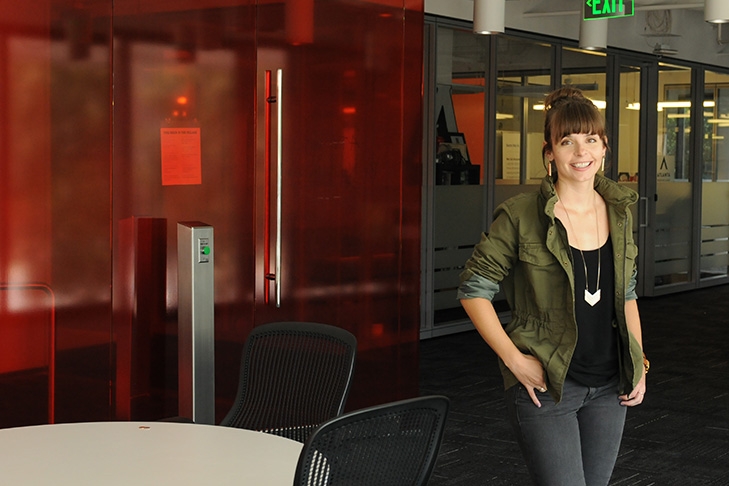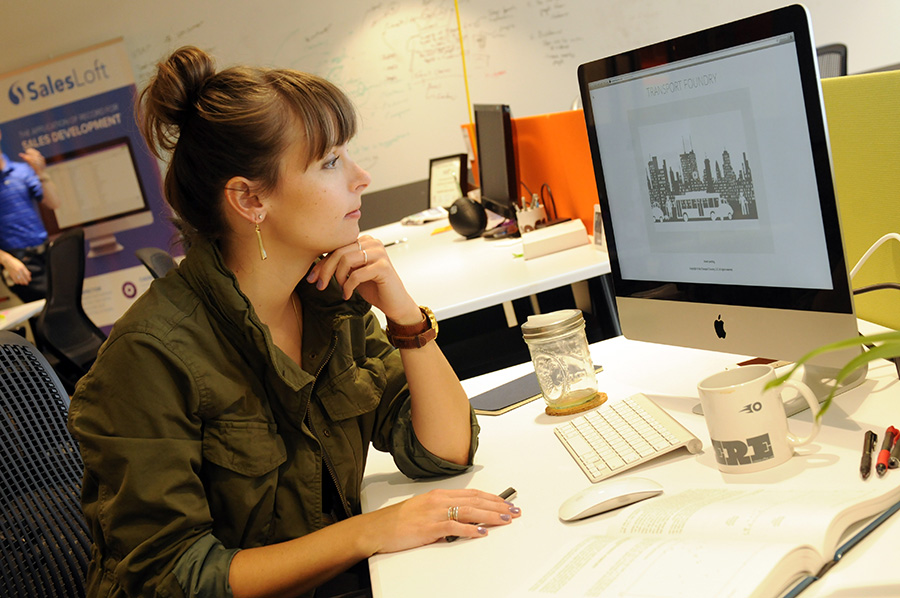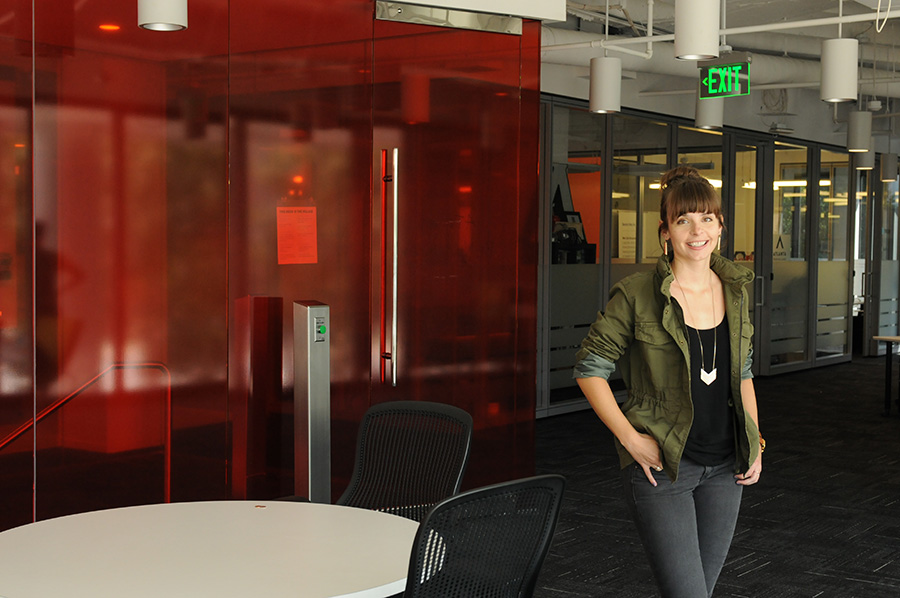

Josie Kressner, Ph.D. 2014, at her desk in the Atlanta Tech Village. Kressner's startup, Transport Foundry, aims to improve the transportation and travel-behavior data regional planners use to make long-term decisions. (Photo by Gary Meek.)
Go back to the year 2000 and think about your typical week. Where did you go? (School, work, restaurants, stores.) How did you get there? (Driving or mass transit? Local roads or highways?) What was traffic like?
Now compare that to this week. Do you go to the same places? Do you get there the same ways? Are you even in the same city?
Transportation planners have to forecast where you and thousands of your neighbors will go and decide what infrastructure your region needs to accommodate those demands. But the data they’re using today, in 2015, is probably a decade and a half old. So even though what you remember of your travels in 2000 is vastly different from your travels today, the 2000 version of you is who’s accounted for in 30-year regional transportation plans.
School of Civil and Environmental Engineering Ph.D. alumna Josie Kressner has a plan to change all that.
Her idea would fix the disconnect and offer a cheaper way to do business. It grew out of her doctoral research at the School of Civil and Environmental Engineering, and now, she’s started a company called Transport Foundry to figure out if her idea could really work.
“We’re looking at things that are very much supposed to be current and relevant,” says Kressner, who earned her doctorate in spring 2014. “We’re analyzing the economy. We’re projecting growth. We’re trying to make decisions about huge federal infrastructure projects that directly impact people’s daily lives.”
With seed money from the National Science Foundation, she’s working on a pilot project with the Atlanta Regional Commission that combines widely available data on consumer demographics with aggregate data from mobile phones — which are all anonymous — to create synthetic household travel data. (Hundreds of companies exist to accumulate and sell both consumer and mobile phone data.)
That means instead of governments spending millions of dollars on surveys asking people to track where they go for a couple of days — surveys that happen once a decade or less — planners would have access to almost real-time information about travel behavior.
“What we want to understand when we’re ultimately using regional models is how different types of people are traveling,” Kressner says. “We can use anonymous mobile-phone data by itself to understand how people are collectively moving through a region, but we don’t know who those people are because of well-founded privacy laws. When we’re talking about government or federal money though, we have to know that it’s being spent equitably. That’s why it’s important to understand who those people are, and that’s where merging the mobile phone data with synthetic, but representative demographic information is necessary.”
Kressner has brought on three part-time employees to help with her pilot study in Atlanta and is preparing to bring on two Georgia Tech students as interns. Initially, she’ll focus on drivers, but she says the next step will be to separate trips using mass transit and trips by bicyclists and pedestrians, which have significant implications for regional planning.
She’s had help with her business plan from the Georgia Tech PhD2Consulting Club and from three professional mentors. She’s working on several other sources of grant funding and has had early conversations with investors who are interested in supporting her work.
They see broader commercial possibilities in Kressner’s models.
 Josie Kressner in office space she shares with other startup companies at the Atlanta Tech Village. Kressner, a 2014 Ph.D. graduate, is developing a way to meld anonymous mobile-phone data with consumer data to improve long-term transportation planning. (Photo by Gary Meek.) |
“Real estate firms are very interested in where people are traveling, what these people look like,” Kressner says. “[So are] business location services. If we can give them that valuable information while still protecting individual privacy, we’d be golden.”
Still, challenges remain for Kressner’s budding company.
She has to get the right companies to sell her the right data at the right price. And since every company has slightly different information, she has to figure out how to make it work all together.
Plus — no small feat here — she has to change the government’s status quo. She needs metropolitan planning organizations to use her synthetic data instead of the traditional household surveys. Then she has to show the federal government her data results in better transportation models.
“There’s all this data out there right now that governments could potentially use, but the data do not fit into the mold of how we traditionally do regional transportation planning,” Kressner says. “My main goal is to format consumer and mobile phone data in a way that protects privacy while allowing agencies to plug the data into their normal [planning] processes.”
Kressner credits her Georgia Tech professors for teaching her about that regional transportation planning process and letting her explore how she might make it better.
“Tech is one of the best transportation engineering programs,” she says. “I am where I am today because of Georgia Tech and the great professors there.”
